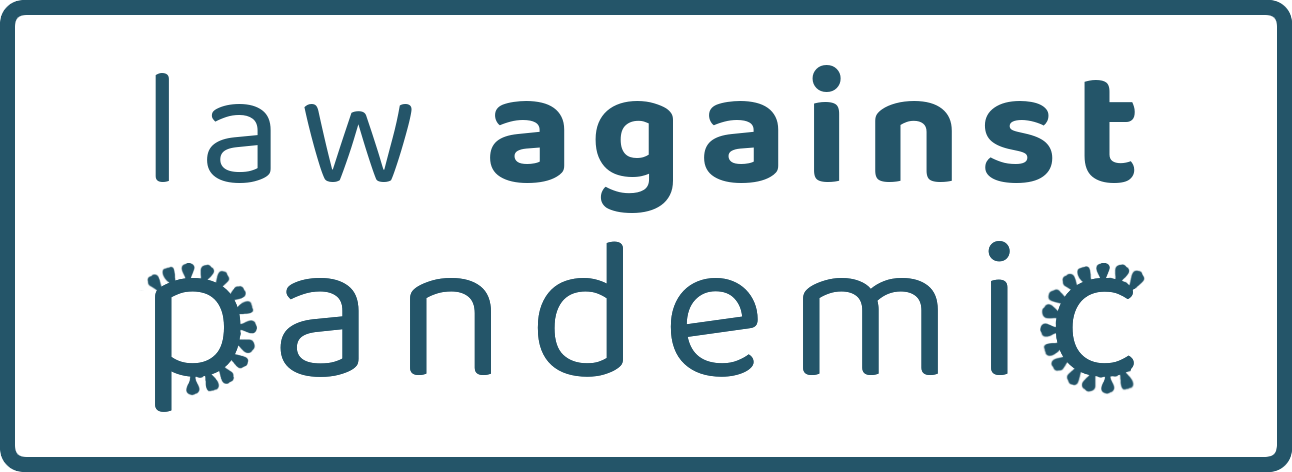
…during the crisis, the one who governs is the Prince, concentrating powers. – N. Machiavelli
The World Health Organization (WHO) declared that the rapid spread of the new coronavirus (COVID-19) around the world configures as a pandemic. WHO director Ghebreyesus declared that the word “pandemic” should be used with extreme caution “(…) it is a word that, if used in the wrong sense, can cause irrational fear or unjustified acceptance that the fight is over, leading to unnecessary death and suffering”.
The pandemic justifies the implementation of the state of exception, the state of emergency in the inner and outer levels. Its implementation invariably affects economic, civil, political activities, restricts rights, imposes limits to freedom, in order to work around concrete problems that originated it and to restore the regular course of social life. The decision to adopt the state of emergency is justified by the insufficiency of normative legal order to predict all the contingencies, critical and extraordinary situations, that threaten the regular course of ordinary life.
The validity of legal norms presumes a factual situation of legal normality and no norm will be valid if an abnormal situation is present. As old Aristotle reminds us: “when the law is expressed universally and a case that is not covered by the universal declaration arises, it is fair, since the legislator failed and missed due to the excess of simplicity, to correct the omission – in other words say what the legislator would have said had him been present, and would have included in the law had him had knowledge of the case” (Aristotle, 1973, p. 336). The generic and abstract law that aims to guide human conduct in a way to grant it predictability, is not strong enough to know all the possible cases of the complex reality, it cannot predict the outbreak of wars, the spread of viruses, natural accidents, etc. It would be, however, possible for the philosopher to correct the flaws of the judge when facing a concrete case if he had behaved as a legislator, he would have done it had he had knowledge of the situation. Although the Stagirite had explained the problem of the contingency by making it visible in the discussion about the limit of generic law applicability while facing a concrete situation, he couldn’t have realized the dimension of the rupture between theory and praxis, law and decision, that occurs in exceptional situations. The excess of complexity of reality, by imposing an extraordinary situation that flees from normative prediction, demands a restorative sovereign decision of derailed legal and social orders.
Aristotle believed that the judge, when facing the impotence of the law, should be capable of putting himself in the place of the legislator and declaring what the latter would declare had him been present and fill his gap. Schmitt disagreed with the philosopher, because the judge could never put himself in the legislator’s place and act as if he were the representative of his will or of the mouth that pronounces the words of the law, as Montesquieu wished. In the understanding of the German jurist, the extreme contingency, the critical situation, the exception, presents a higher weight represents a central a non-peripherical character as Aristotle saw it: every sovereign decision of public order restorative nature is a disruption with the law, and therefore, is ex nihil, which means it derives from a normative nothing, it is a decision for the restoration of law and not a law norm. This stems from the regulatory failure to deal with emergency situations. The truly exceptional situation is the one deprived from any normative predictability, therefore it is guided by the complexity of the concrete case, always with the goal of restoring the normal factual order for the norms to recover their validity. One of the inferences to be drawn from the German jurist’s theory of exception is that in order to achieve the fundamental aim of structuring social life, giving it stability and predictability, a decision is required to partially or fully suspend the laws to restore the purpose principle of law, which is the factual order, without which legal norms cannot apply: the legal order underlies a factual order that can be understood as an order created by a structuring political decision or founding of social reality without which there is no legal order. Under the state of exception, in order to restore public order, rights are restricted, especially freedom, in order to re-establish law, the legal system. Thus, it would be possible to infer the well-known phrase of the German jurist: it is not necessary to have the right to realize the law, which means the need to restrict rights to restore the legal order.
The sovereign who decides on the state of exception, therefore, is not necessarily the mandate of the maximum office of a republic, but it may be another character who is able to decide when it is necessary to enact the exception for the restoration of social order. Necessitas legem non habet, the need, urgency, emergency situation imposed by a pandemic does not have previous laws that establish specific measures to deal with its confrontation, mainly because social, climatic and political variables differ from place to place, in addition the human being is fallible and his enemy, identified as a new coronavirus, is invisible and still somewhat unknown. Faced with the fight against the global viral enemy, the reality pressures politics for a decision to impose a state of exception, precisely the state of defense “to restore in restricted and determined places, public order or social peace threatened by serious or imminent institutional instability or affected by major disasters in nature”. It is imperative in these cases to restrict freedom in order to save lives and restore public order and security. Therefore, we understand that facing the exceptional situation of a viral threat to collective lives of populations spread out across the globe, the right to life assumes primacy in relation to the right to freedom and actions that are in fact effective to face the spread of the disease are actions of public, state and supranational bodies. The exponential viral spread can only be detained with public nature measures that avoid gatherings, promote the closing of establishments, cities, borders, prevent the transit of vehicles and the evacuation of areas, the nationalization of hospitals during the spread of the virus, etc.
However, despite the pandemic imposing a state of global exception, in order not to besiege the sovereignty of political units – which is practically impossible – there is a fundamental question of a temporal nature: it does not affect all countries at the same time. The epicenter of large-scale viral propagation is moving rapidly, but concomitantly to all countries, which allows, in the face of insufficient normative predictability, to learn from the mistakes and successes of other countries in combating the enemy and to adopt measures that prove greater efficiency. The pandemic experience highlights the possible failure of the normative system in the face of the unpredictable, after all it is something new, a new virus that highlights the vulnerability of the normative system and requires its suspension in order to implement extraordinary measures. This challenge leads us to shed light on the relationship between law and politics.
While in the normal situation the legal rules are valid and decisions can be based on the normative order previously established, the exceptional situation requires a sovereign political decision. Its decisive force causes a split between norm and law in order to realize the law regardless of normative predictability and save the legal order by restoring the factual order that presupposes the legal order. The paradox of the exception lies in the fact that in order to save the right it is necessary to act against the right: to save lives, it is provisionally necessary to restrict civil liberties.
The state of emergency has two essential strategic components: a normative framework constituted by constitutional and international norms; and an operational structure involving organization and strategic plans coordinated in a multi-sectoral way with the support and collaboration of the whole society, in the case of a pandemic, of the integral, global society.
It can be represented from the internal and external perspective. Internally, it comes from the formal governmental declaration with political and jurisdictional control in response to an exceptional situation that represents a serious threat to the country. Externally, the threat goes beyond trans constitutional boundaries, affecting other sovereignties – in this case and in most cases, it is the international actors, via international organizations, that trigger the state of emergency.
These interventions, unilaterally or multilaterally, can suspend certain government functions; alert citizens to change their behavior, authorize government agencies to implement contention plans, as well as limit or suspend civil freedoms and human rights, since we are navigating in the field of its absolute protection.
Certain restrictions can be fully justified, considering the prophylactic measures: take precautions to avoid lack of control and make the peak of the pandemic not so high, since there is a virtual threat to the entire population.
The State must respect the limits foreseen by the relevant normative instruments of national and international law, which does not imply in a temporary suspension of the Rule of Law nor does it authorize those who are in power to act in disagreement with the principle of legality, to which they are connected. Some characteristics of the state of emergency are mentioned: temporality; exceptionality; internal and/or external official statement; broad communication; proportionality; legality; revocability of human and fundamental rights.
Two hypotheses need to be discussed, referring to the internal and external plan and which are connected: in the internal plan, could there be a breach of constitutional competences to act in the name of the security of the community? Regarding the external plan, can there be unilateral and/or plurilateral intervention in state sovereignty in the event of a declaration of a state of emergency, of exception, in the global field? Could there be authorization from the United Nations Charter for direct intervention in the name of self-defense, individually or collectively, in the event of an armed attack on the nation that represents imminent risk?
The purpose must be compatible with formal control, which may vary depending on strategic plans: restriction of freedom of the press and prohibition of public meetings, domestic employment of the armed forces, evacuation of people from homes or jobs, searches in homes without a warrant, as long as provided in the emergency law, closing schools, colleges and public institutions. In a state of emergency, the responsibility for government should remain with the civil authorities both nationally and internationally, being the armed forces obliged to provide support as a subsidiary force.
And who should decide about the state of exception? The sovereign, by who is it? And in the current case, while facing a pandemic, that is, a pandemic sickness broadly diffused and in the context of the state of exception, sovereignty is besieged.
The sovereign is the one who decides about the estate of exception and this is a more political matter than it is a legal one. According to Schmitt, the law is not Strong enough to predict exceptional situations and who will act in a sovereign way facing the outgoing crisis.
The flank opens for the theoretical fragmentation of state sovereignty, here designated as besieged sovereignty. Emergency situations triggered in the global context can affect a State’s relations with its neighbors, since everyone has responsibility and interest in ensuring that emergency decrees in the global context, such as the pandemic, for example, are implemented in the national context.
The international Community needs to be actively engaged in guaranteeing that governments observe the standards and quickly guarantee the return to normality so that there is no “legitimate use of force” and no unilateral or plurilateral interventions, since the sovereign will be the one who is capable over abnormalities, in order to partially or fully suspend the legal order and with the means to restore normality.
An emergency situation puts enormous pressure on the state and society and, in order to achieve the desired purpose effectively, the cooperation of citizens is a fundamental element. In this context, the adoption of social restructuring measures becomes adequate to deal with the increasingly complex social demands of society that face the threat of an existential collapse on a global scale.
Solidarity expresses co-responsibility for the destiny of all, with the sharing of the burden of living together. In this pandemic context, it is necessary to understand that the state apparatus, responsible for providing realizing and concretizing services, will not be capable of promoting the contents of the right to life and health by itself. Responsibility should be shared within the scope of the solidarity of integral society, allowing the construction of instruments of cooperation and mutual assistance.
And how do we achieve success against our current enemy? According to Orozimbo Nunes, through awareness, information and responsibility – taking care of yourself means caring for others.
Bibliography:
1. Aristotle.(1954). The Nichomaen ethics. London, Oxford University Press.
2. Branco, P. H. V. B. C., & Hediger, M. (2013). Die unvollendete Säkularisierung. Politik und Recht im Denken Carl Schmitts. 1. ed. Stuttgart: Franz Steiner Verlag.
3. Schmitt, Carl.(1985). Political Theology. Fique chapters on the concept of sovereignty. Translated by Georg Schwab, Massachusetts, MIT Press.


